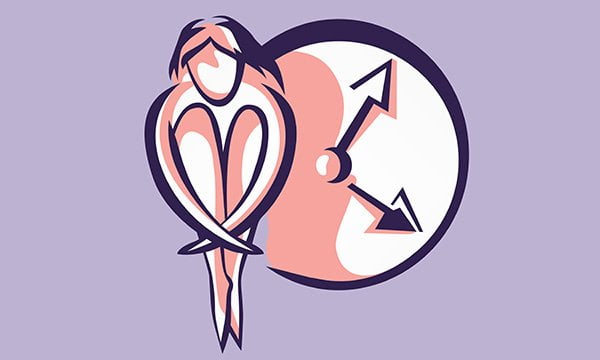For individuals with female reproductive organs, menopause is a significant milestone that marks the permanent cessation of menstrual cycles, in other words, the ending of the reproductive years. Menopause is, however, not a single event but a gradual transition that occurs with age and spans over months and years. As this natural process of reproductive aging unfolds, various biological and psychological changes may surface that can prove to be challenging. Even so, what seems clear is that mindset matters when it comes to this phase of life.

https://dm1zcrsul8wju.cloudfront.net/sites/rcn_nspace/files/styles/full_width_banner/public/Article-images/155341/menopause_web_istock.jpg?itok=eSZSlFQz
Menopause in Stages
The process of menopause can be described in the following three stages, the length and age of onset of which vary among individuals:
Perimenopause is “an ill-defined time period that surrounds the final years of a woman’s reproductive life” (Santoro, 2016, p. 332). As menopause approaches, aberrations occur in the ovaries’ secretion of estrogen and other hormones, resulting in the onset of menstrual irregularity. This onset marks the beginning of perimenopause, a transitional phase leading up to menopause, and ends a year after the final menstrual period.
Menopause is defined as “the permanent cessation of menstruation resulting from the loss of ovarian follicular activity” (Sherman, 2005, p.4s) as the ovaries stop releasing eggs altogether. It is only after 12 consecutive months without a menstrual period, in other words, a year after the final menstrual period, that menopause is said to have occurred. For most, this takes place between ages 40 and 55 (Hu et al., 2016), and for Hong Kong women, the median age of menopause is 51 (Family Health Service, 2016).
Postmenopause refers to the period of an individual’s life after menopause has occurred.
What to Expect?
Menopause is a time of significant change. Due to shifts in the levels and secretion patterns of hormones, various physical, mental, and mood symptoms may follow. Although studies suggest that the prevalence and experience of menopausal symptoms vary considerably across the world (as cited in Ayers, Forshaw, & Hunter, 2010), some symptoms are common and can occur at any of the three stages.
Physical symptoms may include:
- Hot flashes (sudden feeling of heat with or without flushed skin, heart palpitation, and sweating)Night sweats
- Problems with sleep
- Menstrual irregularities (e.g. changes in the amount of blood flow, cycle length)
- Vaginal dryness and pain during sexual intercourse
- Dry skin
- Change in sex drive
- Headache
- Fatigue
Mental and mood symptoms may include:
- Mood swings
- Low or depressed mood
- Anxiety
- Irritability
- Difficulty concentrating
- Memory problems (often temporary)
Menopause and Mental Health
While the mental and mood symptoms experienced during menopause are not significant for most people, this transition period appears to increase individuals’ vulnerability to mental health symptoms and disorders as with other periods of reproductive transitions like menstruation, pregnancy, and postpartum. This is likely due to the fluctuations of reproductive hormones and the multitude of changes that coincide with these times of transitions. For instance, multiple longitudinal studies found that the risk of developing depressive symptoms and disorder is higher during (e.g., Bromberger & Kravitz, 2011; Cohen et al., 2006) and possibly after the menopause transition (e.g., Maartens et al., 2002). At the same time, some evidence (Hu et al., 2016) seems to suggest that symptomatic menopause transition might elevate the risk of new-onset depressive disorders, bipolar disorders, anxiety disorders, and sleep disorders.
Although the increased vulnerability to psychiatric symptoms and disorders during menopause may be partly attributable to fluctuations in reproductive hormones, evidence supporting this is mainly indirect (Bromberger & Kravitz, 2011). Many other factors appear to be at play instead. For example, having a prior history of depression or anxiety disorder has been associated with a greater risk of depressive symptoms and disorder during menopause (Bromberger & Kravitz, 2011). In addition, frequent discomfort from the physical symptoms of menopause like hot flashes and poor sleep also appears to contribute to this increased vulnerability. Meanwhile, having inadequate social support, facing financial strain, and dealing with stressful life events all have a role to play. Last but not least, smoking and having a higher body mass index have also been associated with higher depressive symptoms during menopause (Bromberger & Kravtiz, 2011).
Managing Menopause
- Mindset matters
Our attitudes can affect our experiences. For example, a study (Avis et al., 1997) found that women with more negative attitudes towards menopause before the menopausal transition reported more menopausal symptoms later on. Meanwhile, in another study (Carmody et al., 2006), women reported a 40% reduction in hot flashes severity during and after a 7-week mindfulness-based stress reduction program. By accepting the changes that come with reproductive aging, remembering that these symptoms are often temporary, and adopting a positive mindset, the experience of menopause may just become more tolerable.
- Learn about and monitor the physical, mental, and mood symptoms that can occur with the menopausal transition
- Seek professional help if needed
Do not hesitate to seek help from medical professionals and mental health professionals for distressing or severe menopausal symptoms. Help is available to alleviate or support the management of bothersome symptoms.
- Connect with others
Having social support provides a buffer against the negative effects of stress. Sharing experiences of menopause with other women can be a great way to connect, provide support for one another, and not feel alone in this transition.
- Learn to manage stressors
Caring for aging parents and adjusting to being empty nesters are some of the common stressors during this phase of life. Learning ways to cope with and manage stressors is always helpful to mental health, especially during a period of increased vulnerability. - Avoid smoking
- Maintain a healthy lifestyle
Be sure to have a balanced diet, exercise regularly, and get adequate rest to maintain optimal health and reduce potential symptoms.
If you are interested in scheduling a session with Dr Natalie Loong or have further queries, please contact us today.
References:
Avis, N. E., Crawford, S. L., & McKinley, S. M. (1997). Psychosocial behavioural and health factors related to menopause symptomatology. Womens Health, 3, 103-20.
Ayers, B., Forshaw, M., & Hunter, M. (2010). The impact of attitudes toward the menopause on women’s symptom experience: A systematic review. Maturitas, 65, 28-36. doi:10.1016/j.maturitas.2009.10.016
Bromberger, J. T., & Kravitz, H. M. (2011). Mood and menopause: Findings from the study of women’s health across the nation (SWAN) over 10 years. Obstetrics and Gynecology Clinics of North America, 38, 609-625. doi:10.1016/j.ogc.2011.05.011
Carmody, J., Crawford, S., & Churchill, L. (2006). A pilot study of mindfulness-based stress reduction for hot flashes. Menopause, 13, 760-9. doi: 10.1097/01.gme.0000227402.98933.d0.
Cohen, L. S., Soares, C. N., Vitonis, A. F., Otto, M. W., & Harlow, B. L. (2006). Risk for new onset of depression during the menopausal transition: The Harvard study of moods and cycles. Archives of General Psychiatry, 63, 385-90. doi: 10.1001/archpsyc.63.4.385.
Hu, L. Y., Shen, C. C., Hung, J. H., Chen, P. M., Wen, C. H., Chiang, Y. Y., & Lu, T. (2016). Risk of psychiatric disorders following symptomatic menopausal transition: A nationwide population-based retrospective cohort study. Medicine, 95, 1-7. doi:10.1097/MD.0000000000002800
Maartens, L.W., Knottnerus, J.A., & Pop, V.J. (2002). Menopausal transition and increased depressive symptomatology: A community based prospective study. Maturitas, 25, 195-200. doi: 10.1016/s0378-5122(02)00038-5
Santoro, N. (2016). Perimenopause: From research to practice. Journal of Women’s Health (2002), 25, 332–339. doi:10.1089/jwh.2015.5556
Sherman, S. (2005). Defining the menopausal transition. The American Journal of Medicine, 118, 3s-7s. doi:10.1016/j.amjmed.2005.11.002
The Government of the Hong Kong Special Administrative Region Department of Health, Family Health Service. (2016). Dealing with menopause (FHS-WH26AB). Retrieved from https://www.fhs.gov.hk/english/health_info/woman/14768.pdf

